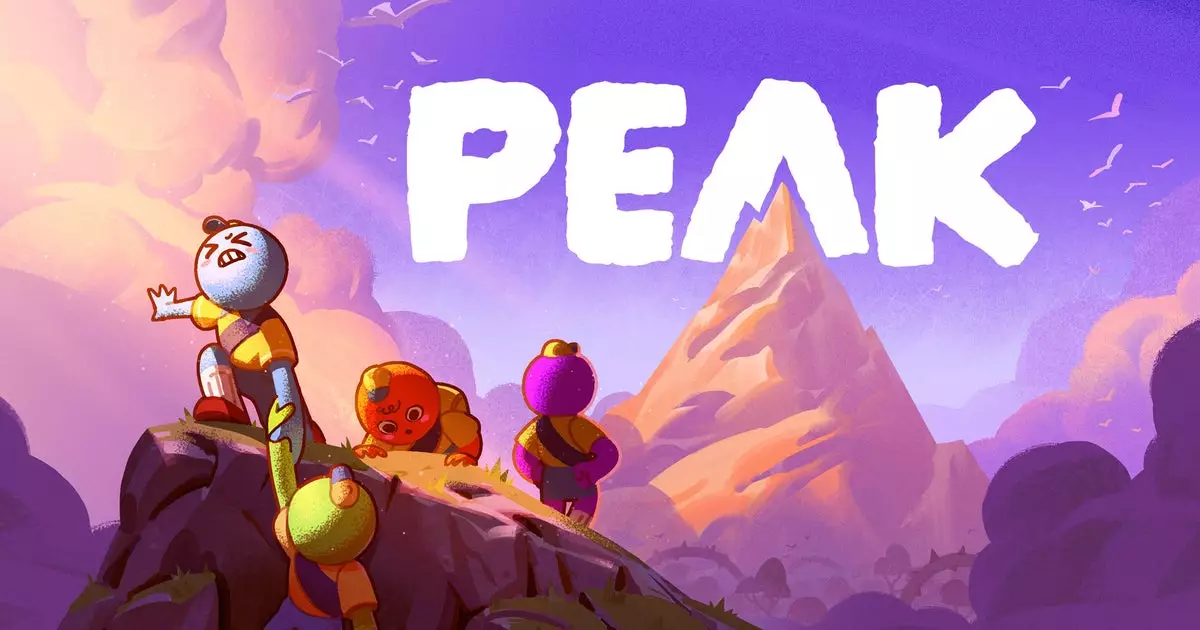In the fast-paced world of video game development, the path to creating a successful title often resembles a winding road filled with unexpected turns. The recent release of Peak serves as a remarkable case study illustrating how feelings of jealousy can morph into a vibrant, engaging game. Conceived during a collaborative game jam hosted by developers Aggro Crab and Landfall, Peak is not just a playful nod to teenagers’ slang; it’s a co-op expedition where players tackle the exhilarating—and often chaotic—task of mountain climbing with friends.
The inspiration for Peak, according to Aggro Crab’s head Nick Kaman, was a blend of jest and real emotional representation of their competitive spirit. The team found themselves envious after witnessing the success of Content Warning, another game birthed from a one-month game jam. While the initial comment might seem humorous, it’s rooted in a genuine attempt to leverage competitive energy to foster creativity and innovation. Surprisingly, the competitive edge did not just spark jealousy; it ignited a collaborative flame, pushing the developers to see their potential in rapid game creation amidst high stakes and pressures.
Seizing Opportunities in Unlikely Spaces
The collaboration unfolded in a starkly creative environment—an Airbnb in Hongdae, South Korea. Rather than relying on traditional corporate settings, the developers established an atmosphere engendering creativity and innovation. Their decision to dedicate a month to this project is a testament to the enriching benefits of immersive team dynamics.
This venture was not without its unique challenges, however. The aggressive time constraints forced the team to be inventive under pressure while simultaneously grappling with the emotional burden of their previous longer, more draining project, Another Crab’s Treasure. Kaman highlighted this juxtaposition, emphasizing that although they were on the brink of launching a significant title, the opportunity to create something new alongside Landfall was too enticing to pass up.
Their immediate focus upon arrival was to establish a functional workspace, culminating in a humorous yet practical experience: assembling office furniture—belonging to the local indie scene—right after touching down in a foreign country. The hilarity of this start reflects the essence of Peak itself, which is filled with chaotic fun set against the backdrop of social camaraderie.
A Concept Born from Unlikely Roots
The genesis of Peak was planted even earlier—the idea sprouted in an unassuming hot tub in Sweden. Here, the potential framework of the game was introduced, albeit in a less defined form, originally revolving more around an open-world survival theme. The concept evolved dramatically over discussions, with the essence of teamwork and absurd challenges resonating with the developers, ultimately leading to the formulation of lost scouts stumbling together on a sparsely populated island.
Such a development trajectory highlights the organic nature of creativity in video game design. The evolution reflects the ongoing conversation and collaboration among developers. It’s clear that while the concept began vaguely, the eventual collaboration during the jam helped to rectify and refine their original ideas into an engaging gaming experience, demonstrating that great ideas often flourish through continuous dialogue and exploration.
The Fine Line between Quality and Success
Although Peak has garnered significant sales, it’s essential to tread carefully when associating quick development with quality. The success is largely attributable to the seasoned expertise of both Aggro Crab and Landfall. Their extensive backgrounds contrast sharply with the more naive approach of new developers looking to quickly replicate this model. The reality is that while the game jam format offers unique opportunities for innovation, it should not be construed as a universal path to success.
Instead, Peak serves as a reminder of the balance between fostering creativity, embracing competition, and understanding the intrinsic value of experience in the intensely competitive gaming industry. The development journey exemplifies that success is as much about the relationships formed and experiences shared as it is about the final product released into the market. So while developers might hope to replicate the success of Peak, they would be wise to emphasize the importance of passion, collaboration, and intentionality in their own creative endeavors.

